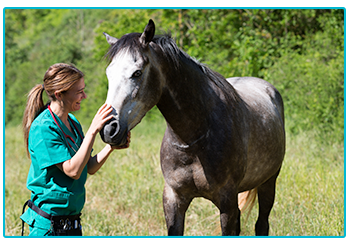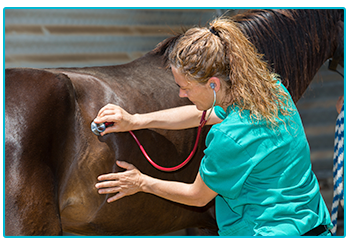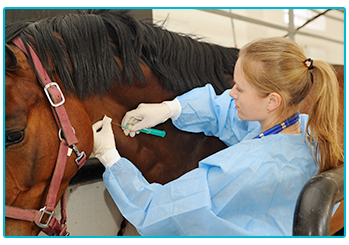Equine herpesvirus is more common than people may think. In fact, it is believed that the majority of adult horses will have come into contact with the virus at some point in their lives! Despite being so common, the virus can have serious consequences for your equine friend. Read on to find out everything you need to know about EHV, including symptoms, prevention and more!

What is EHV?
There are several different types of equine herpesvirus, some of which can lay dormant and symptomless in your horse. The most common forms of the virus are EHV-1 and EHV-4. EHV-1 can cause respiratory disease, especially when contracted by young horses. It can also cause miscarriages in pregnant mares,* and neurological problems which can lead to paralysis. Similarly, EHV-4 commonly causes respiratory problems and can occasionally lead to miscarriage.
The Symptoms
There are a number of symptoms that you might see in your horse if it has contracted equine herpesvirus, including:
– Nasal discharge
– Lethargy
– Balance and coordination issues
– Increased temperature
If you’re worried about your horse and are noticing any of these symptoms, refer to your vet. They’ll be able to help identify, diagnose and potentially treat the problem.

Treatment
Unfortunately, since EHV is a virus, there is no cure. You can, however, take steps to improve your horse’s discomfort while they fight off the viral infection. Medications like antibiotics might help with secondary infections, and anti-inflammatory drugs might help if your horse is not eating or drinking. Again, you’ll want to refer to your vet before giving your horse any medication.
Vaccination
Your horse can be vaccinated against both EHV-1 and EHV-4 to protect your equine friend against respiratory conditions and miscarriage. Typically, this will consist of two vaccinations when they’re younger, the first starting at around 5 months old and the next 4 weeks later. After this, you’ll need booster vaccinations every month to ensure your four-legged friend is still protected.

Prevention
Because of the prevalence of the virus, and the fact that it can lay dormant for so long, the risk of contracting EHV can be high. To help prevent the spread, you might want to quarantine an infected horse. This includes using separate tack, grooming equipment, feed and trailers, as the virus can be spread through all of these. It can also be spread through contaminated hands and even clothing, so washing hands thoroughly is important.
We hope this guide has given you some insight into equine herpesvirus and the steps you can take to help prevent it! If you’re worrying about your horse’s health and spot any symptoms, always refer to your vet for advice. In case your horse does fall ill, you might want to think about taking out horse insurance. At The Insurance Emporium, our Horse Insurance is tailor-made with a range of Optional Benefits to suit your needs, including Vet’s Fees cover. Gallop on down to The Insurance Emporium to find out more!
* The Insurance Emporium Equine Insurance does not cover any claim directly or indirectly consequent upon or contributed to by pregnancy or foaling.
All content provided on this blog is for informational purposes only. We make no representations as to the accuracy or completeness of any information on this site or found by following any link on this site. We will not be liable for any errors or omissions in this information nor for the availability of this information. We will not be liable for any loss, injury or damage arising from the display or use of this information. This policy is subject to change at any time.


